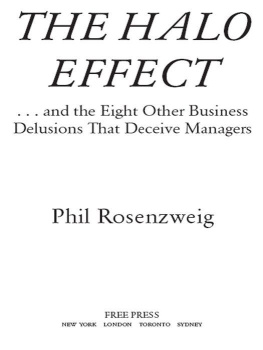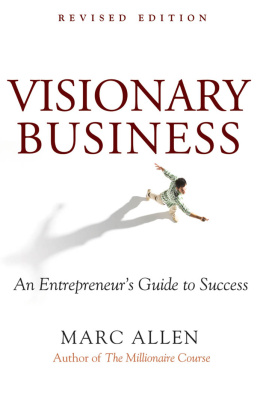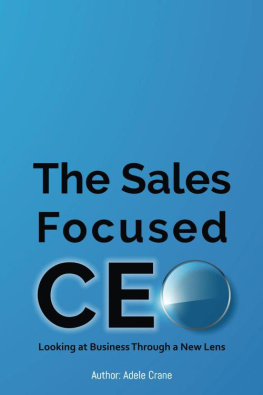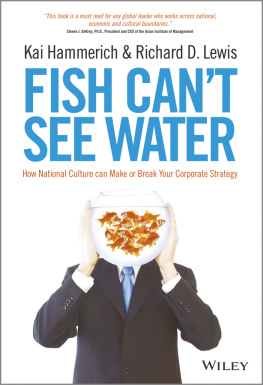

Free Press
A Division of Simon & Schuster, Inc.
1230 Avenue of the Americas
New York, NY 10020
Copyright 2007 by Philip Rosenzweig
All rights reserved,
including the right of reproduction
in whole or in part in any form.
FREE PRESS and colophon are trademarks of Simon & Schuster, Inc.
Library of Congress Cataloging-in-Publication Data
Rosenzweig, Philip M., 1955
The halo effectand the eight other business delusions
that deceive managers / Phil Rosenzweig.
p. cm.
Includes bibliographical references
1. Industrial management Philosophy. 2. Business enterprises Public opinion.3. Fallacies (Logic) 4. Success in business. I. Title.
HD30.19.R67 2007
658 dc22
2006049010
ISBN-13: 978-1-4165-3858-5
ISBN-10: 1-4165-3858-5
Lyrics to How Little We Know, words by Carolyn Leigh and music by Philip Springer, courtesy of Alfred Publishing, Co., Inc.
Visit us on the World Wide Web:
http://www.SimonSays.com
To my parents,
Mark and Janine Rosenzweig
Contents
Why do some companies prosper while others fail? Despite great amounts of research, theres much we dont know. While some studies of company performance meet the standard of science, many are better described as pseudoscience they follow the form of science but are better described as stories.Cisco Systems surged in the late 1990s with a brilliant strategy, a laserlike focus on its customers, and a masterful skill for acquisitions. When the bubble burst, Cisco was said to have bungled its strategy, neglected its customers, and made reckless acquisitions. History was rewritten in light of diminished performance.While times were good, ABB was a New Age wonder with a great corporate culture, a futuristic organization, and a hero at the helm. When it collapsed, ABB was remembered as having a complacent culture, a chaotic organization, and an arrogant leader. ABB hadnt changed much the difference was mainly in the eye of the beholder.A central problem that clouds so much of our thinking about business is
The Halo Effect. Many things we commonly believe
lead to company performance corporate culture, leadership, and more are often simply attributions
based on company performance.Can academic research about company performance overcome the Halo Effect? Only if it measures independent variables in a way thats truly independent of performance. Even then, many studies have other flaws, including
The Delusion of Correlation and Causality and
The Delusion of Single Explanations.Examining two well-known bestsellers,
In Search of Excellence and
Built to Last, we find strong evidence of the Halo Effect as well as other errors such as
The Delusion of Connecting the Winning Dots, The Delusion of Rigorous Research, and
The Delusion of Lasting Success.Subsequent studies, including
Good to Great, tried to be even more elaborate and ambitious but reveal still more mistakes in their thinking about company performance, including
The Delusion of Absolute Performance, The Delusion of the Wrong End of the Stick, and
The Delusion of Organizational Physics.Many popular business books are deeply flawed as science, but are appealing because they work well as stories. They inspire and comfort their readers. Yet they also focus attention on the wrong priorities and sometimes lead managers in dangerous directions.So what
does lead to high performance? One approach looks at just two elements: strategic choice and execution. Yet both are full of uncertainty, which explains why company performance can never be guaranteed and why efforts to isolate the secrets of success will always come up short.How can managers press onward without delusions? Consider a few managers who set aside wishful thinking and guide their companies with wisdom and clarity, recognizing the uncertain nature of business performance and working to improve their probability of success. In closing, a few words for wise managers.
The Halo Effect and
Other Business Delusions
The tendency to look at a companys overall performance and make attributions about its culture, leadership, values, and more. In fact, many things we commonly claim drive company performance are simply attributions based on prior performance.
Two things may be correlated, but we may not know which one causes which. Does employee satisfaction lead to high performance? The evidence suggests its mainly the other way around company success has a stronger impact on employee satisfaction.
Many studies show that a particular factor strong company culture or customer focus or great leadership leads to improved performance. But since many of these factors are highly correlated, the effect of each one is usually less than suggested.
If we pick a number of successful companies and search for what they have in common, well never isolate the reasons for their success, because we have no way of comparing them with less successful companies.
If the data arent of good quality, it doesnt matter how much we have gathered or how sophisticated our research methods appear to be.
Almost all high-performing companies regress over time. The promise of a blueprint for lasting success is attractive but not realistic.
Company performance is relative, not absolute. A company can improve and fall further behind its rivals at the same time.
It may be true that successful companies often pursued a highly focused strategy, but that doesnt mean highly focused strategies often lead to success.
Company performance doesnt obey immutable laws of nature and cant be predicted with the accuracy of science despite our desire for certainty and order.
Preface
T his book is about business and management, success and failure, science and storytelling. Its written to help managers think for themselves, rather than listen to the parade of management experts and consultants and celebrity CEOs, each claiming to have the next new thing. Think of it as a guide for the reflective manager, a way to separate the nuggets from the nonsense.
Of course, for those who want a book that promises to reveal the secret of success, or the formula to dominate their market, or the six steps to greatness, there are plenty to choose from. Every year, dozens of new books claim to reveal the secrets of leading companies, from General Electric and Toyota to Starbucks and Google. Learn their secrets and apply them to your company! Other books profile hugely successful business leaders like Michael Dell or Jack Welch or Steve Jobs or Richard Branson. Find out what makes them great, then go do likewise! Others tell you how to become an innovation powerhouse, or craft a failsafe strategy, or devise a boundaryless organization, or make the competition irrelevant. Heres the way to beat your rivals!
In fact, for all the secrets and formulas, for all the self-proclaimed thought leadership, success in business is as elusive as ever. Its probably more elusive than ever, with increasingly global competition and technological change moving at faster and faster rates which might explain why were tempted by promises of break-throughs and secrets and quick fixes in the first place. Desperate circumstances push us to look for miracle cures.













